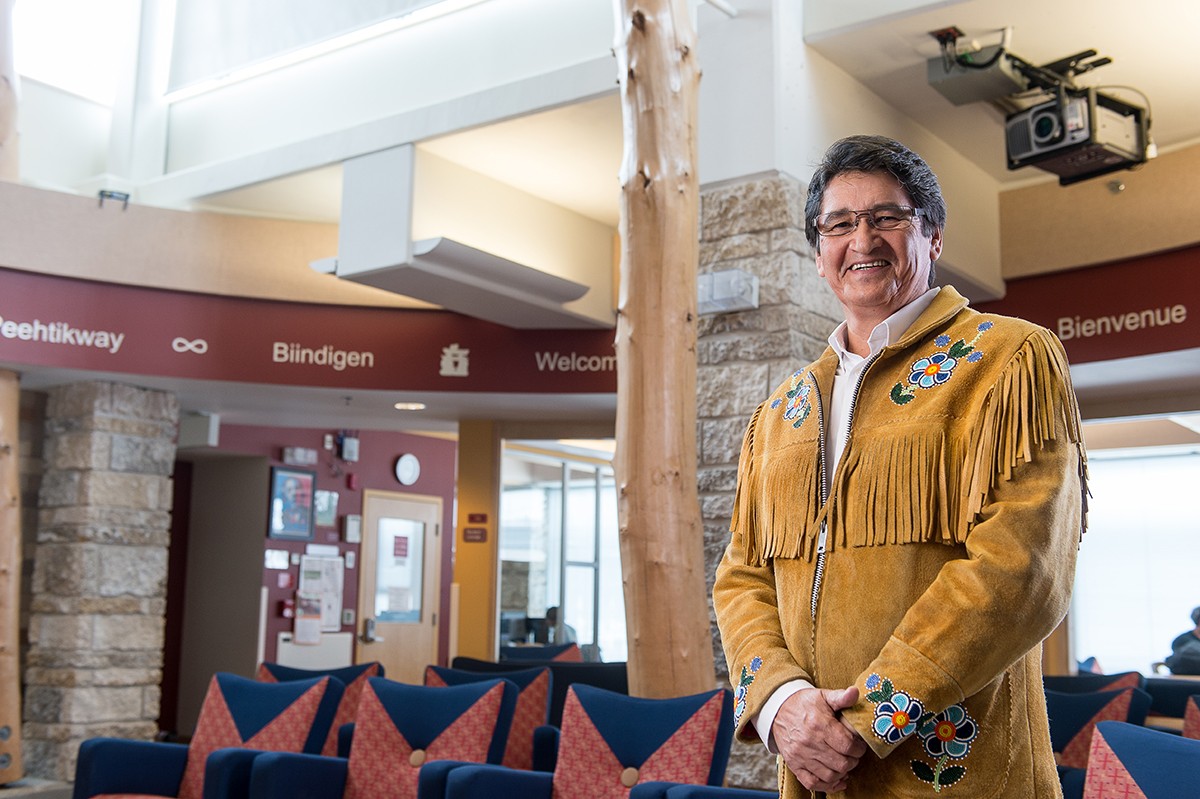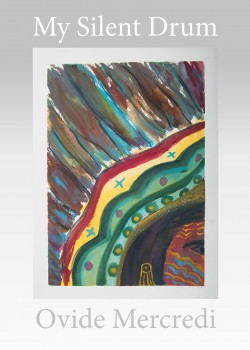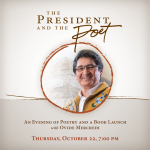
My Silent Drum
Ovide Mercredi is best known for his work as a lawyer, activist and political leader. So when people find out he also writes poetry, it’s unexpected.
“I developed a certain tag that people attach to me. In that tag there is no section that says he writes poetry. It’s more like he’s a politician. He’s an advocate for his people,” says Mercredi. “When they see that I can write poetry, they are initially surprised.”
But after reading My Silent Drum, Mercredi’s first collection of poetry, it becomes clear that his poems are an extension of his work in justice and politics.
“It’s another way of communicating our desire to make changes in our lives, or to improve our country,” says Mercredi, who began writing poems when he was National Chief of the Assembly of First Nations in 1991.
“As an advocate you speak about the problems of a people and you try to get Canadians to understand. In a poem it’s more distant and it’s not so immediate in one’s face. It’s a way in which they can be educated about the problems without feeling threatened. That’s important.”
In his foreword to My Silent Drum, U of M President and Vice-Chancellor Dr. David Barnard says, “These poems help us think about our nation and ourselves.”
Barnard, who frequently quotes poetry at public events, has used Mercredi’s work on occasion. “I found it to be very thoughtful and powerful. When I have used it in public settings it has been well received indeed.”
My Silent Drum covers a number of social issues like Residential Schools, homelessness and sexual abuse. It also deals with Mercredi’s views of religion and spirituality, the earth and water. The poems often give animals, birds and other natural elements a voice.
“They do the talking, not me,” says Mercredi. “I try to tie their voice to a storyline that links history to the present. In a way they become like a short story.”
The willow spoke of ancient tools
But no one listened
No one heard
TV blaring.
In times past the ancients listened
Made their tools
To cull the heards
Hunters daring.
Willow weeps in silence
Ancient ways abandoned
Traditional knowledge forgotten
No one sharing.
Willow waits for regeneration
But a lost generation does not hear
The story told by the willow
No one caring.
– Willow Weeps (August 24, 2005)
In other poems, Mercredi’s own voice comes through. “I try as much as possible, not to be preachy, but you know what? It’s very hard not to in some cases, like when you’re dealing with Treaties and the absence of the implementation of Treaties. There’s a poem called Take it All, But. Here’s a good example of ranting, in a different way, about grievances.”
Take it all… you say, even my dreams don’t belong to me
What right have I to insist on my destiny and my lands?
Here, keep all the land, you say I do not use it anyway!
Rule the animals, the fishes, the water, even the majestic Mountains
What need have I to tell the land how to divide itself for sale/
I have no desire to scrape the face of the Mountains or dam the rapids
Neither do I have the interest to erect skyscrapers and high-rise banks
You way many different peoples will come to occupy and own the land
That I am obsolete! That my way of life is disappearing, that new ways
are appearing
That like will be better. That you will change my children, even how they
think
Take it all… but when you do, be very careful not to destroy my life and
land
– excerpt from Take it All, But
Although Cree is his first language, Mercredi wrote My Silent Drum in English, with some Cree words here and there. “The thing is, a Cree book, who’s going to read it? So I have to adapt. But a lot of the structure, the thought process is influenced by the Cree language more than it is by the English language.
“These poems help us think about our nation and ourselves,” says University of Manitoba President and Vice-Chancellor David Barnard. “I found it to be very thoughtful and powerful.”
“Take the poem about the Saskatchewan River; I’m not sure a Canadian poet would write that kind of poem. It’s really a poem about the Saskatchewan River talking about its life and when it enjoyed life the most and it says my life before Canada. So that’s what I’m saying. My poems are influenced by where I came from.”
I watched them drink from my shores
I let them bathe and clean their brown bodies
And to use my water for cooking their foods
I was happy when my water was in Ceremony
Neheywak knew how to pray with me.
– excerpt from A River
Mercredi, who never studied poetry and even admits that he hasn’t really read that much poetry, hopes to encourage young Indigenous people who read My Silent Drum.
“I’m hoping that they will say to themselves, well if he can write poetry, so can I and I’m hoping it will inspire them to take seriously their own literary talent. Because it’s there, but it’s unexposed and it’s untapped.”
As for Canadians, Mercredi hopes My Silent Drum will teach them about the issues Indigenous people deal with.
“Whether it’s development, environmental destruction or something like Residential Schools. That they will see this as a way of learning more – an incentive to learn more about the issues and that they will become allies as opposed to critics.”
[rev_slider president-and-the-poet]
Mercredi launched My Silent Drum, Thursday, October 22, 2015 at 7 p.m. in Marshall McLuhan Hall. The event was part of the U of M’s The President and the Poet series and featured Dr. David T. Barnard, President and Vice-Chancellor of the University. All proceeds from My Silent Drum will go to the Ovide Mercredi Bursary Endowment Fund at the U of M. My Silent Drum is published by Aboriginal Issues Press.
Ovide Mercredi, (LLB/77) received the University of Manitoba Distinguished Alumni Award in 2013. During his time as a student, he was one of the leaders who helped to form the first Native Students’ Association in Canada. He went on to become a respected leader and advocate for Indigenous rights, including two terms as National Chief of the Assembly of First Nations. Mr. Mercredi is a board member of Canadians for a New Partnership, and has served as Senior Advisor to the President for the U of M. His vision continues to contribute to the growth and development of our University, including his support of Front and Centre – the campaign for the University of Manitoba – and in particular the Indigenous Achievement campaign pillar. Mercredi believes, “Education is the path towards economic freedom and wealth for Indigenous Peoples. At the U of M we pledge to do our share to build a strong Aboriginal middle class. Our shared future demands no less.”








